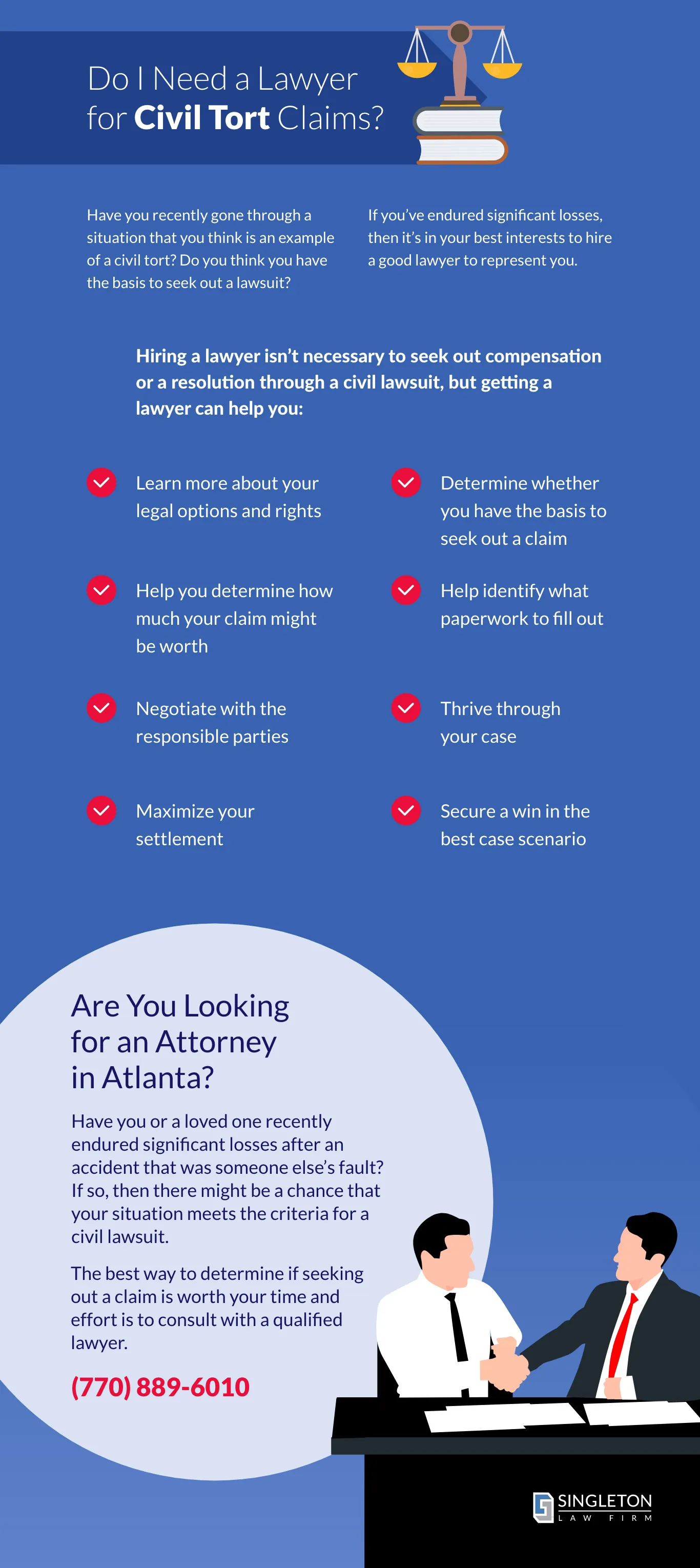Many Americans mistakenly believe our justice system only involves the criminal aspects, but it’s actually comprised of two distinct systems: criminal and civil laws.
Our nation’s criminal court system penalizes and punishes individuals guilty of committing wrongs, but that system doesn’t do much to support the victims of intentional and willful wrongs. The good news is that civil tort law and the civil court system are set up to do just that – provide financial compensation to victims who have been hurt by someone else’s actions.
If you suffered financial harm that’s someone else’s fault, then don’t hesitate to learn your legal options.
Here at Singleton Law Firm, we strive to help individuals seek justice by utilizing the civil court system to their advantage. Learn more about civil tort law, common examples of civil lawsuits, and how our personal injury law firm can help you seek justice below.
Infographics
Scroll down to our Tort Law infographics:
What is a Civil Tort?
The civil law system in America is set up to help solve legal disputes that don’t give rise to criminal actions but are considered civil torts. Civil torts, by law, are wrongful actions (or inaction) that cause another person to suffer a harm or loss. The law assigns legal liability to the person who committed the civil tort in these situations.
Civil tort law covers a wide variety of wrongful actions that could cause harm to another person. The purpose of the civil law system is to give victims a path of recourse when they’ve been harmed by a civil tort. In some cases, the solution comes in the form of a court order requiring the other party to stop committing the harmful act. In other cases, the solution comes in the form of financial compensation to the injured party.
Civil wrongdoing is a blanket term that describes many actions from economic harm to violating someone’s Constitutional rights. We’ll get into more detail about how these torts are classified below, but the process of a lawsuit usually goes as follows:
1. One party commits a civil tort
2. The civil tort causes harm to another party
3. The other party incurs damages in the form of physical, emotional, or financial harm
4. The other party seeks out a civil lawsuit
5. Courts analyze the evidence and make a ruling that solves the dispute
While this is the typical process, not every lawsuit will follow this path. In fact, many of them will end before step five. That’s because both parties may decide to settle outside of court to keep the process simple and short.
How Are Torts Classified?
Civil torts are categorized into three main types: Intentional, unintentional, and strict liability torts. All of these civil wrongdoings can give rise to a civil lawsuit. Let’s breakdown these different types of torts below:
Intentional Torts
Intentional torts are wrongful acts that someone commits on purpose. In these cases, the intent of the perpetrator is irrelevant so long as the act itself was committed intentionally. The perpetrator may have harmed a person or damaged that person’s property. The harm the person suffers does not have to be physical. It could be financial harm.
It’s important to note that intentional torts can also be crimes, too. Acts like assault, kidnapping, battery, robbery, and other criminal acts are also intentional torts. If the person who harmed you has already faced charges in criminal court, then it’s still possible to seek out a civil lawsuit, too. It does not matter whether the perpetrator was convicted or got found not guilty. You can still seek out a claim against them. Keep in mind, too, that civil court has a lower threshold of evidence to find a person guilty. So, if you didn’t find justice in criminal court, then you might still have hope to rectify the situation to a degree in civil court.
Not all intentional torts are criminal offenses. Defamation, for instance, isn’t a crime, but it is a civil tort.
Unintentional Torts
Unintentional torts are defined as wrongful action (or inaction) that harms another person. Unlike intentional torts, harm arises after an accident occurs that was the direct result of the perpetrator’s negligence. There are four elements of negligence, which include:
1. One party has a legal duty to provide for another person’s care
2. That party fails to uphold their legal obligation
3. This breach of duty leads to an accident
4. The accident causes measurable harm
Keep in mind that the first element, a legal duty of care, might exist even if it’s not explicitly outlined by law. For instance, all motorists have an implied duty to provide for the care of everyone else on the road. This isn’t spelled out exactly by law, but it is implied.
Strict Liability Torts
Strict liability torts happen when one party engages in an inherently dangerous activity and ends up hurting someone else. Due to the level of danger involved in these types of situations, the injured person does not have to prove the original party was negligent. An example of an inherently dangerous activity would be if one party chose to adopt a dangerous dog and allow it to run freely in a child park area. If that dog bites a child, then the pet’s owner would be immediately held liable for the accident.
What Are Some Common Civil Tort Examples?
Understanding the legal lingo and classifications of civil torts will only take you so far. You likely want to know if your specific situation falls into one of those categories, and you might not be sure if your case rises to the standard of a civil claim. To help you make a determination, here are some of the most common types and examples of real-life tort situations:
• Assault or battery
• Product liability injuries
• Premises liability accidents
• Defamation
• Invasion of privacy
• Trespassing
• False imprisonment
• Medical malpractice
If you’re still not sure, then it might be best to consult with an attorney about your specific situation. Every civil tort situation is unique, so a lawyer will be able to provide you with some solid legal advice you can act on.
Are There Any Civil Tort Defenses?
Do you feel like you have a potential civil lawsuit on your hands? If so, then you might wonder whether seeking out a claim is really worth your time and effort. After all, the other party will likely come up with some excuse or reason as to why they shouldn’t bear the financial fallout of the accident. There are legal defenses to committing a civil wrong. Below, we’ll go over a few of the most common defenses used in courtrooms in civil lawsuits.
Consent
While it’s not too often, sometimes the injured party may have consented to the civil tort or wrongdoing that led to the accident or injury. If consent was present, then the other party can use that as a strong defense to your lawsuit. It’s important to note, though, that the law distinguishes that some people do not have the capacity to consent including intoxicated individuals, underage children, and people with a diminished mental capacity.
Self-Defense or in the Defense of Others
Another common defense strategy is for the other party to say that they committed the civil tort in self-defense or in the defense of others. Defense is a viable legal strategy if the other party can prove it.
Necessity
Another valid strategy is to argue the civil tort was committed out of necessity. Necessity is usually only a good defense strategy if the harm was damage to property rather than a person.
Comparative Negligence
Like many situations in life, often fault can’t be 100% attributed to one party after an accident. In most cases, many parties are partially at fault. That’s why courtrooms in Georgia follow a comparative negligence standard. Under this type of standard, each party is financially liable for the fallout of an accident based on the percentage of fault they contributed to the crash. One party can seek out a lawsuit so long as their percentage of fault isn’t equal to or higher than the other party you’re collecting compensation from.
With all this in mind, the other party can use comparative negligence and claim that you were actually partially at fault, too, as part of their defense strategy.
Assumption of Risk
Another common defense argument is that the injured person took on an assumption of risk by participating in a dangerous activity. For this defense to be successful, the party must prove or show evidence that the injured person had knowledge of the potential dangers of the activity before they participated. In many instances, this proof is documented by signing a contract of terms and conditions or an acknowledgment of the dangers beforehand.
What Are Some Common Remedies Awarded in Tort Law Cases?
You also likely want to know more about the potential compensation you can get by pursuing a lawsuit. After all, it’s not going to be worth it to seek out a claim if you’re not going to get the compensation you deserve.
In general, civil lawsuits seek to make the victim financially whole again if the other party is fully liable. These damages are called compensatory damages, and they’re defined as the economic damages awarded to the plaintiff for monetary harm they suffered. These damages might include things like medical expenses, property damage, or lost wages.
Victims can also collect non-economic damages for emotional distress and damages. Pain and suffering is a common type of non-economic damage.
Punitive damages are rarely awarded, but if the other party was extremely negligent, reckless, or acted in wanton disregard for human life, then courtrooms might order these damages. They’re not meant to compensate the victim but to punish the perpetrator. It’s also meant to deter the perpetrator from acting the same way in the future.
Do I Need a Lawyer for Civil Tort Claims?
Have you recently gone through a situation that you think is an example of a civil tort? Do you think you have the basis to seek out a lawsuit? If you’ve endured significant losses, then it’s in your best interests to hire a good lawyer to represent you. Hiring a lawyer isn’t necessary to seek out compensation or a resolution through a civil lawsuit, but getting a lawyer can help you:
• Learn more about your legal options and rights
• Determine whether you have the basis to seek out a claim
• Help you determine how much your claim might be worth
• Help identify what paperwork to fill out
• Negotiate with the responsible parties
• Thrive through your case
• Maximize your settlement
• Secure a win in the best case scenario
Are You Looking for an Attorney in Atlanta?
Have you or a loved one recently endured significant losses after an accident that was someone else’s fault? If so, then there might be a chance that your situation meets the criteria for a civil lawsuit. The best way to determine if seeking out a claim is worth your time and effort is to consult with a qualified lawyer.
The best civil attorneys will listen to the fact surrounding your accident. Then, they’ll consider the various laws in your specific area. From there, they’ll make a qualified opinion on whether the situation would give rise to a successful lawsuit. If a lawyer thinks you have a case, then they’ll work with you to ensure justice is served and you get access to the compensation you deserve.
By far, finding the best civil attorney to represent your needs is the hardest part of the process. You want a lawyer who is experienced, well-informed, genuine, passionate, and qualified. Further, they need to be available to take on your case, too.
If you are currently searching for the right attorney in Atlanta, contact our office to discuss your situation in more detail with one of our best attorneys.
Infographics





